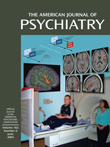Abnormal Brain Activation During Inhibition and Error Detection in Medication-Naive Adolescents With ADHD
Abstract
OBJECTIVE: Patients with attention deficit hyperactivity disorder (ADHD) and a medication history have shown abnormal brain activation in prefrontal and striatal brain regions during cognitive challenge. Previous findings have been confounded, however, by potential long-term effects of stimulant medication exposure and group discrepancies in task performance. The aim of this study was to investigate whether medication-naive adolescents with ADHD would still show abnormal brain activation in prefrontal brain regions during motor response inhibition in a task designed to control for intergroup performance discrepancies. METHOD: Rapid, event-related functional magnetic resonance imaging was used to compare brain activation in 16 medication-naive ADHD adolescents and 21 IQ-, age-, and sex-matched healthy comparison volunteers during a challenging, idiosyncratically adjusted task that required withholding of a triggered motor response. The design, which manipulated task parameters to force each subject to fail on 50% of trials, ensured that subjects worked at the edge of their own inhibitory performance, thereby controlling for intersubject and intergroup performance discrepancies and furthermore allowing for investigation of differences in brain activation related to inhibition and inhibition failure. RESULTS: Medication-naive adolescents with ADHD showed significantly reduced brain activation in the right inferior prefrontal cortex during successful motor response inhibition and in the precuneus and posterior cingulate gyrus during inhibition failure, both of which correlated with behavioral scores of ADHD. CONCLUSIONS: The study shows that abnormal brain activation during inhibitory challenge in ADHD is specific to the disorder, since it persists when medication history and performance discrepancies are excluded.



